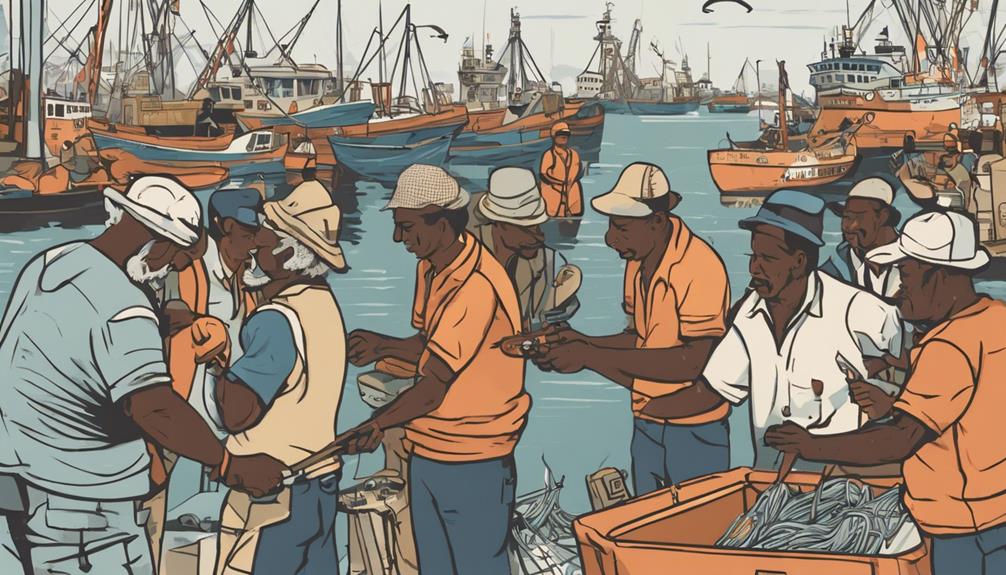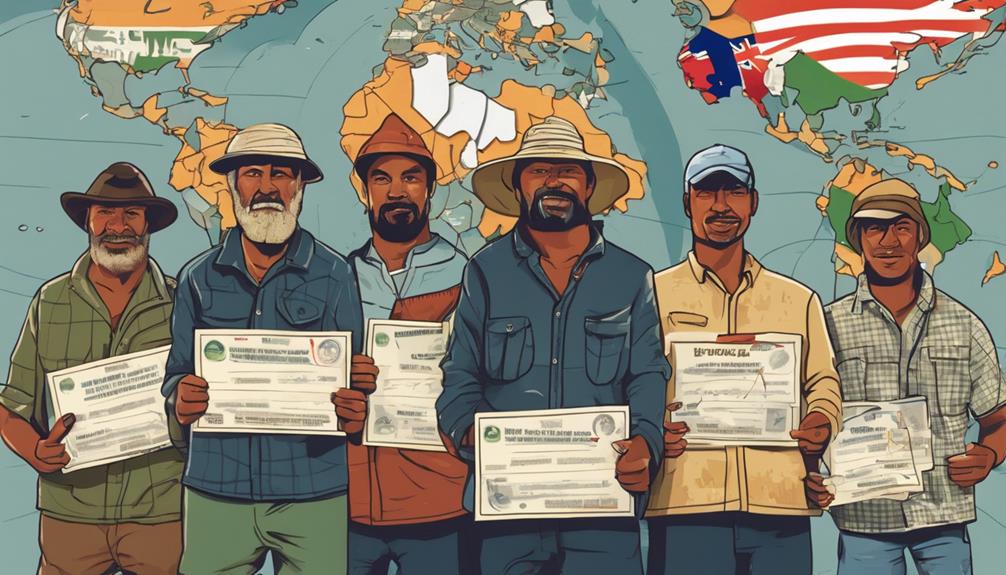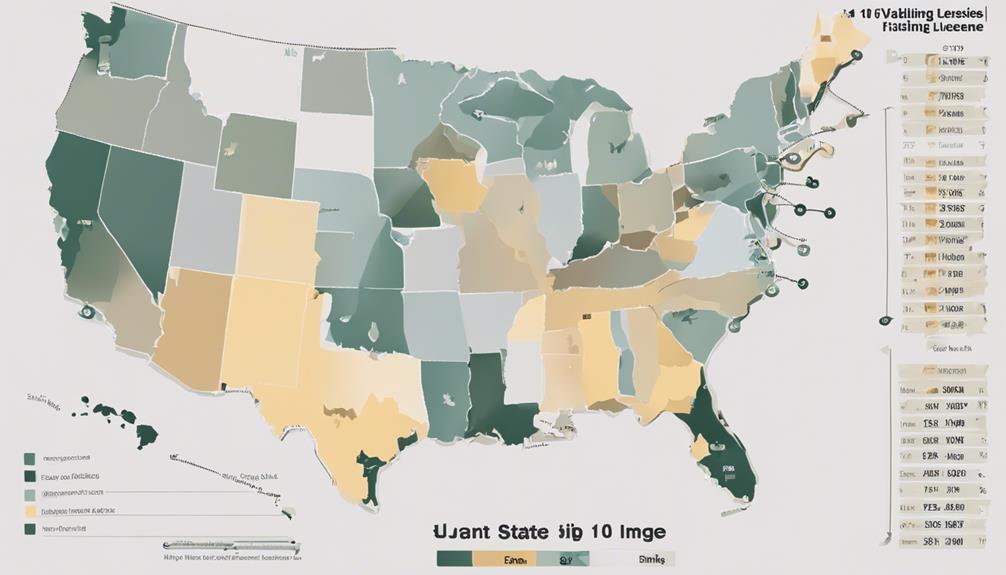Did you know that over 50 countries around the world have specific regulations governing international fishing licenses? Understanding the intricacies of these regulations is crucial for any angler venturing beyond their home waters.
From the types of licenses available to the enforcement of catch limits, navigating the global landscape of fishing regulations can be a daunting task.
Stay informed on how to acquire, maintain, and comply with international fishing license regulations to ensure your next fishing adventure is not only successful but also legal and sustainable.
Overview of International Fishing Licenses
When fishing internationally, it's crucial to understand the regulations surrounding fishing licenses. These licenses play a vital role in conservation measures and monitoring of fish populations. By requiring anglers to obtain a license, authorities can keep track of the number of fish being caught, ensuring sustainability for future generations.
Moreover, fishing licenses have a significant economic impact on local communities. Revenue generated from license fees often goes towards funding conservation projects and supporting the enforcement of fishing regulations. This not only helps protect marine environments but also boosts the local economy by creating jobs in the fishing and tourism industries.
To ensure the effectiveness of fishing license regulations, monitoring systems are put in place to track compliance and assess the impact of fishing activities on marine ecosystems. By collecting data on catch levels and fishing efforts, authorities can make informed decisions to promote sustainable fishing practices.
Types of Fishing Licenses Available
Understanding the importance of international fishing licenses, let's now explore the various types available for anglers.
When it comes to fishing licenses, there are different types designed to cater to various needs and circumstances. One common distinction is between recreational and commercial licenses. Recreational licenses are typically for individuals who fish for sport or leisure, while commercial licenses are required for those engaging in fishing for profit or trade.
License restrictions and exemptions vary depending on the type of license and the region. Some licenses may have specific restrictions on the species that can be caught, the size or quantity of fish, or the location where fishing is allowed. Exemptions from licensing requirements may apply to certain groups such as children under a certain age, elderly individuals, or individuals with disabilities.
Regional variations in fishing license requirements are significant. Each country has its own regulations and may have different types of licenses available based on local fishing practices and conservation efforts. For example, coastal countries may have specific licenses for saltwater fishing, while landlocked countries may focus more on freshwater fishing licenses. Understanding these regional variations is crucial for anglers looking to fish in international waters.
Application Process for Fishing Licenses
Navigating the application process for fishing licenses can vary depending on the region and type of license you're seeking. To begin, make sure to check the license eligibility criteria specific to the area where you plan to fish. Some regions may have restrictions based on age, residency status, or other factors. Understanding these requirements is crucial to ensure a smooth application process.
When applying for a fishing license, you'll need to gather the necessary documents to support your application. Common document requirements include a valid form of identification, such as a driver's license or passport, to verify your identity and age. Additionally, you may be asked to provide proof of residency if applicable, especially for local resident fishing licenses. It's essential to have these documents ready in advance to prevent any delays in the application process.
In some cases, you might also need to provide specific information about the type of fishing you intend to do or the species you plan to target. This information helps authorities assess the environmental impact of your fishing activities and determine the appropriate licensing for your needs. By carefully preparing and submitting all required documents, you can increase your chances of obtaining a fishing license efficiently.
Fishing License Fees and Costs
To learn about the fees and costs associated with fishing licenses, review the pricing breakdown provided by the relevant regulatory agency.
When considering fishing license fees, there are a few key factors to keep in mind:
- License Renewal: Look into whether the fishing license needs to be renewed periodically. Some licenses are valid for a lifetime, while others require annual renewal. Understanding the renewal process can help you plan your fishing activities effectively.
- Cost Comparison: Compare the costs of fishing licenses across different regions or countries. Prices can vary significantly, so it's essential to evaluate the expenses involved in obtaining a fishing license in various locations. This comparison can help you make informed decisions based on your budget and fishing preferences.
- Additional Fees: In some cases, there may be additional fees associated with fishing licenses, such as processing fees or conservation fees. Be sure to factor in any extra costs when calculating the total expenses of obtaining a fishing license.
Validity Period of Fishing Licenses
When obtaining a fishing license, it's crucial to be aware of the validity period to ensure compliance with regulations. Fishing licenses have expiration dates that vary depending on the issuing country or region. It's essential to check the expiration date on your license to avoid fishing illegally once it expires. Failure to renew your license on time can lead to fines or other penalties, so staying informed about the expiration date is key.
Renewal requirements for fishing licenses also differ among countries. Some places may offer automatic renewal options, while others require you to reapply or go through a specific process to renew your license. It's your responsibility as a fisherman to know the renewal requirements and ensure your license is up to date before heading out to fish.
To avoid any issues, make sure to mark the expiration date on your calendar or set a reminder to renew your fishing license on time. Understanding the validity period and renewal requirements of your fishing license is essential for staying compliant with regulations and enjoying your fishing activities without interruptions. Always double-check the expiration date and follow the necessary steps for renewal to continue fishing legally.
Regulations on Catch Limits and Species
Ensure you comply with regulations by abiding by the catch limits and species restrictions set forth for fishing activities. Conservation measures are crucial to protect marine life and sustain fisheries for future generations. Compliance with catch limits helps prevent overfishing and ensures the balance of aquatic ecosystems. International cooperation and monitoring efforts are essential for the effective implementation of these regulations to safeguard fish populations worldwide.
- Conservation Measures: Adhering to catch limits and species restrictions is vital to conserve fish stocks and maintain the overall health of marine environments.
- Compliance with Regulations: By following the set guidelines, you contribute to the preservation of aquatic biodiversity and support sustainable fishing practices.
- International Cooperation: Working together with other countries promotes a unified approach to fisheries management, leading to more effective conservation measures on a global scale.
Monitoring plays a key role in overseeing fishing activities and ensuring that regulations are being followed. By staying informed about catch limits and species restrictions in different regions, you can actively participate in the conservation of marine resources. Remember, your responsible actions as a fisherman are crucial in protecting the oceans and sustaining fish populations for the future.
Renewal and Transfer of Fishing Licenses

Transitioning from adhering to catch limits and species restrictions, the process for renewing and transferring fishing licenses is essential for maintaining compliance with regulations and ensuring continued access to fishing activities.
When it comes to the renewal process, it's crucial to be proactive and aware of the expiration date of your fishing license. Renewal procedures vary by country, so it's recommended to check with the relevant authorities well in advance to avoid any interruptions in your fishing endeavors. Typically, you may be required to fill out a renewal application, provide updated personal information, and pay any associated fees. By staying on top of your renewal, you can continue enjoying fishing legally and responsibly.
In the case of license transfer, certain countries allow for the transfer of fishing licenses between individuals under specific circumstances. This process usually involves notifying the issuing authority of the transfer and ensuring that the new license holder meets all necessary requirements. It's essential to follow the guidelines set forth by each country to transfer a fishing license correctly.
Enforcement of International Fishing Regulations
To ensure compliance with international fishing regulations, authorities actively enforce licensing requirements and catch limits. Enforcement measures and compliance strategies are crucial for protecting marine resources and ensuring sustainable fishing practices worldwide. Here are three key aspects to consider:
- Patrols and Inspections: Authorities conduct regular patrols both on the water and at ports to monitor fishing activities. Inspections of fishing vessels help verify that the correct licenses are held, and catch limits are being adhered to. Violations can result in penalties such as fines, license suspensions, or even vessel confiscation.
- Electronic Monitoring: Increasingly, electronic monitoring systems are being used to track fishing vessels' locations, activities, and catch. These systems provide real-time data to authorities, allowing them to detect potential violations more effectively. Electronic monitoring helps enhance transparency in the fishing industry and deters illegal fishing practices.
- International Cooperation: Collaboration among countries is vital for enforcing international fishing regulations. Joint patrols, information sharing, and coordinated enforcement actions help combat illegal, unreported, and unregulated (IUU) fishing activities across borders. International agreements and partnerships strengthen enforcement efforts and promote sustainable fisheries management on a global scale.
Frequently Asked Questions
Are There Any Age Restrictions for Obtaining an International Fishing License?
When getting an international fishing license, age restrictions may apply. These rules are often in place to ensure safety and compliance with fishing regulations. Keep this in mind when planning family fishing trips abroad.
Make sure to check the specific requirements for obtaining a fishing license in each country you visit. Remember, it's important to follow all regulations to have a smooth and enjoyable fishing experience while traveling.
Can I Use My International Fishing License in Multiple Countries or Do I Need to Get a Separate License for Each Country I Visit?
You can use your international fishing license in multiple countries if there are reciprocity agreements in place. Check the fishing locations and regulations to ensure your license is valid across borders.
Some countries may require separate licenses, so plan your cross border fishing accordingly. Always verify travel logistics and legal requirements before casting your line in new waters.
Are There Any Specific Regulations Regarding the Use of Certain Fishing Equipment or Techniques With an International Fishing License?
When using an international fishing license, you may encounter specific regulations on fishing equipment restrictions and conservation techniques. These rules aim to promote sustainable practices and protect marine life.
Catch limits may also be in place to ensure the fish population remains stable.
It's important to familiarize yourself with these regulations in each country you visit to adhere to their guidelines and contribute to the preservation of the environment.
Do I Need to Have a Certain Level of Fishing Experience or Training to Obtain an International Fishing License?
To get an international fishing license, you don't usually need specific fishing experience or training. While some countries may have certain requirements, most just require you to follow their rules and regulations.
As long as you meet the criteria set by the country you're fishing in, like obtaining the necessary permits and understanding local fishing laws, you should be good to go. Just do your research and enjoy your fishing adventure!
Are There Any Penalties or Fines for Violating International Fishing Regulations With an International Fishing License?
If you violate international fishing regulations with an international fishing license, there are enforcement consequences and legal repercussions to consider. Violation penalties can include fines or other punishments.
It's important to adhere to the rules and guidelines to avoid facing these penalties. Make sure to understand and follow the regulations in order to have a smooth fishing experience without any legal issues.
Conclusion
Overall, obtaining an international fishing license can be a straightforward process, but it's important to be aware of the regulations and requirements in each country you plan to fish in.
Remember to always follow catch limits and species regulations to help preserve the environment and ensure sustainable fishing practices.
With the right knowledge and preparation, you can enjoy fishing in different countries while respecting their rules and regulations. Happy fishing!



